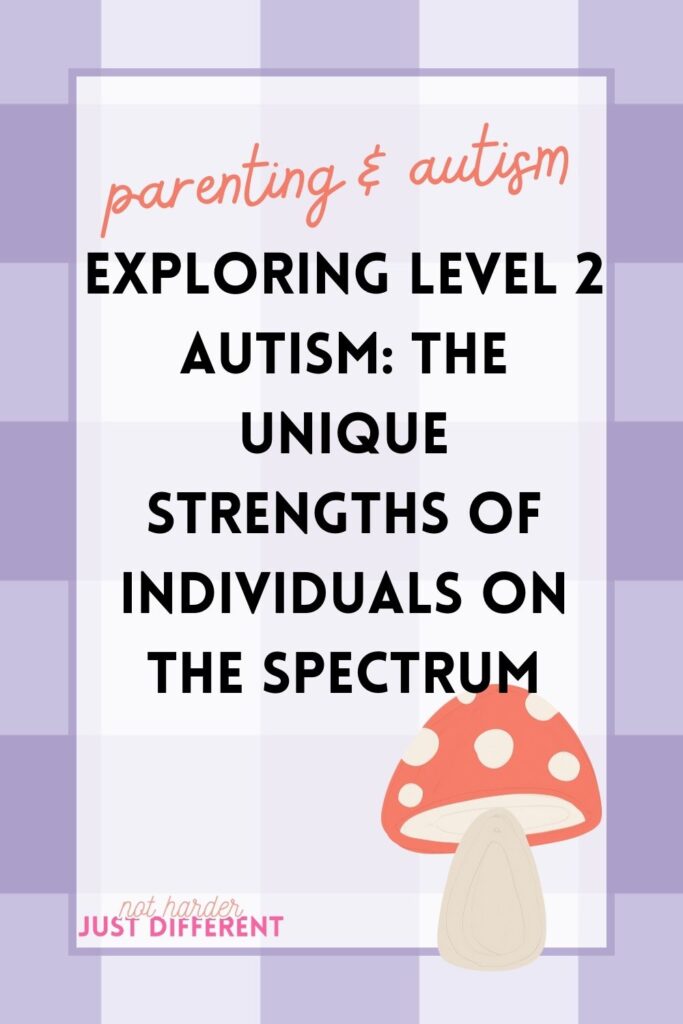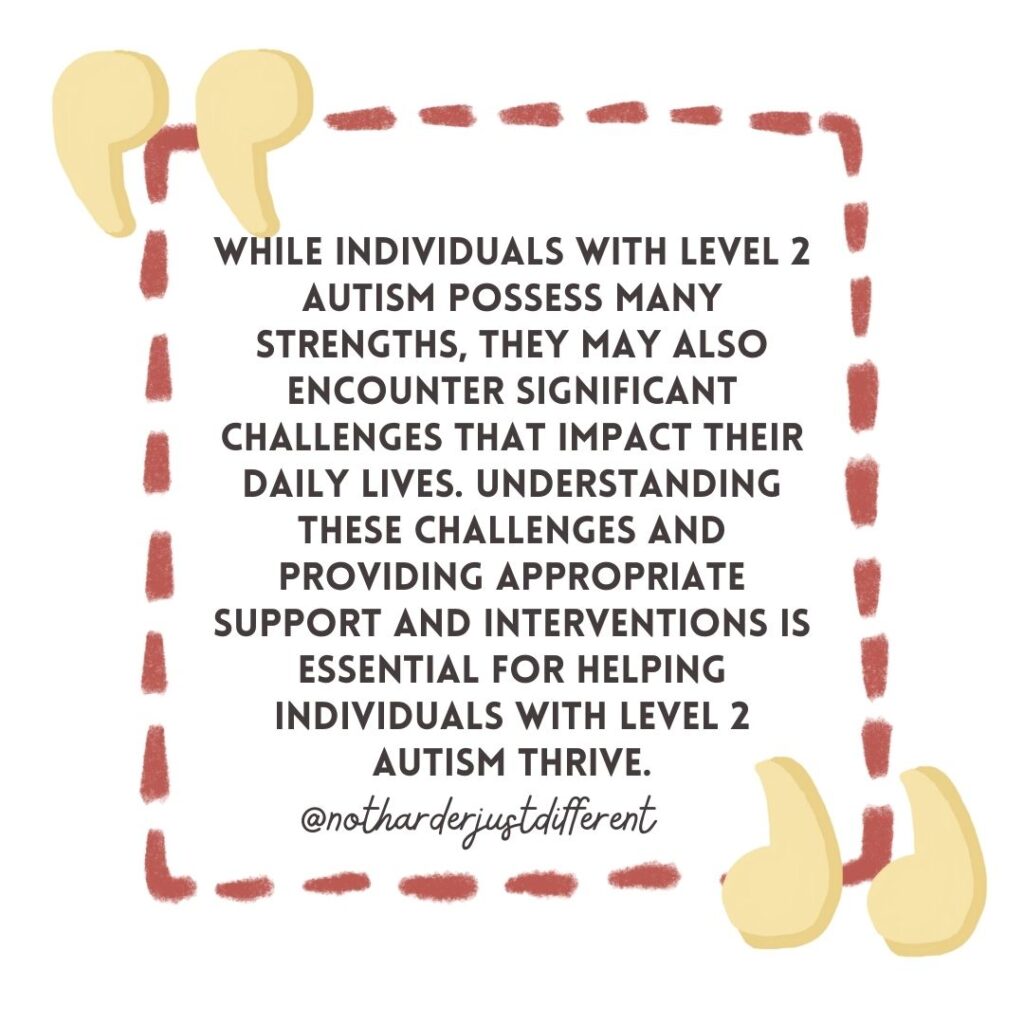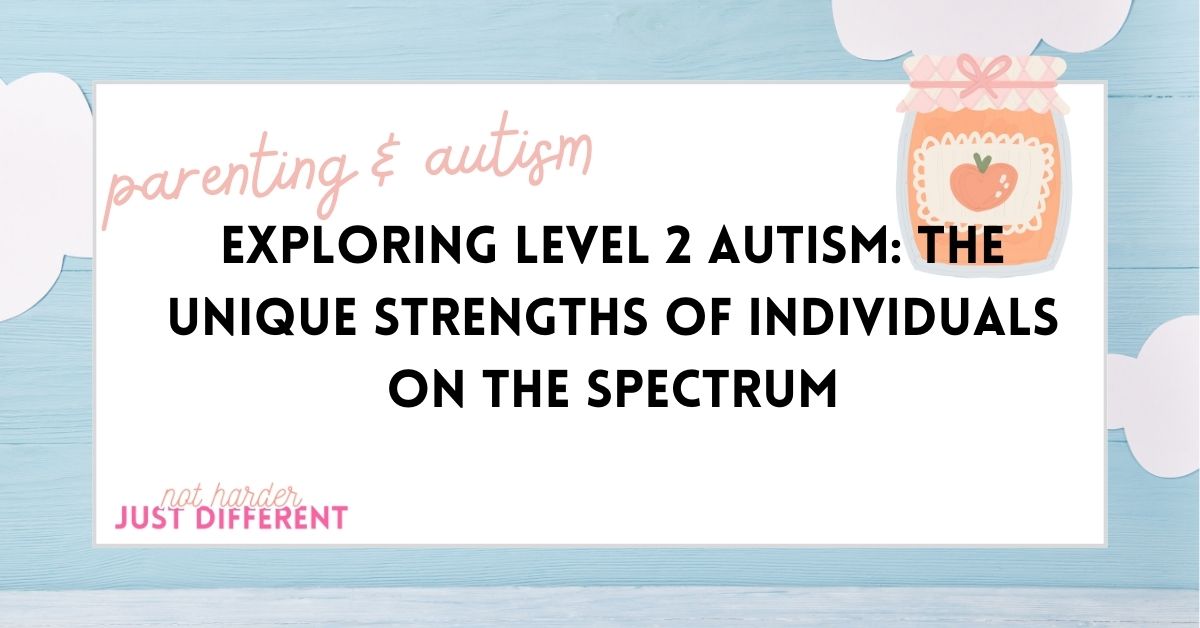Disclaimer: As a future Licensed Clinical Social Worker (LCSW) currently pursuing my master’s degree, I am passionate about sharing insights and information related to parenting, autism and homeschooling based on my personal experiences and research. However, the content shared on this blog is not intended to substitute professional advice, diagnosis, or treatment. Parenting is a deeply personal journey, and while I strive to provide valuable insights, every family and situation is unique. Readers are encouraged to consult with qualified professionals for personalized guidance tailored to their specific needs and circumstances.
So, you’re curious about Level 2 autism, huh? Well, you’ve come to the right place! Level 2 autism is part of the autism spectrum, and it’s all about recognizing and celebrating the amazing strengths and talents of individuals who are on this part of the spectrum.
Table of Contents
First things first, let’s talk about what Level 2 autism actually means. Basically, it’s a way of describing individuals who have autism and require more support in their daily lives compared to those with Level 1 autism. But here’s the thing – just because they need more support doesn’t mean their strengths are any less incredible! In fact, individuals with Level 2 autism often have unique abilities and talents that make them truly remarkable.
Now, let’s shift our focus to the strengths-based approach we’re taking here. Instead of just focusing on the challenges that individuals with Level 2 autism may face, we’re all about highlighting their incredible strengths and talents. Because let’s be real, everyone has strengths, right? And individuals with Level 2 autism are no exception! So, get ready to be inspired as we explore some of the amazing strengths and abilities that make individuals with Level 2 autism truly shine.

Understanding Level 2 Autism
Level 2 autism, also known as “moderate” autism, is a term used to describe individuals who have autism spectrum disorder (ASD) and require substantial support in their daily lives. It’s important to understand that autism is a spectrum disorder, meaning that it encompasses a wide range of abilities, challenges, and characteristics.
Individuals with Level 2 autism may exhibit significant difficulties in social communication, sensory processing, and repetitive behaviors. They may struggle with understanding social cues, maintaining relationships, and navigating social interactions. Additionally, individuals with Level 2 autism may experience sensory sensitivities and challenges, such as hypersensitivity to noise or textures, which can impact their daily functioning.
One key aspect of Level 2 autism is the level of support and intervention needed to help individuals navigate their daily lives. While individuals with Level 2 autism may have strengths and abilities, they often require more support compared to those with Level 1 autism. This support may include assistance with communication, social skills training, sensory integration therapy, and behavioral interventions.
It’s important to recognize that Level 2 autism is not a one-size-fits-all category. Each individual with Level 2 autism is unique, with their own strengths, challenges, and characteristics. By understanding and acknowledging the diversity within Level 2 autism, we can better support and advocate for individuals on the spectrum, helping them reach their full potential and lead fulfilling lives.
Common Strengths of Individuals with Level 2 Autism
While individuals with Level 2 autism may face significant challenges, they also possess many strengths and talents that are worth celebrating. Here are some common strengths often seen in individuals with Level 2 autism:
- Attention to Detail: Individuals with Level 2 autism often exhibit a keen attention to detail. They may have a remarkable ability to notice patterns, inconsistencies, and subtle differences in their environment. This attention to detail can be valuable in various settings, such as academic pursuits, artistic endeavors, and problem-solving tasks.
- Exceptional Memory: Many individuals with Level 2 autism have an exceptional memory, particularly when it comes to their areas of interest. They may possess encyclopedic knowledge about specific topics and can recall information with remarkable accuracy. This memory prowess can be a valuable asset in academic, professional, and personal pursuits.
- Creative Thinking: Individuals with Level 2 autism often demonstrate creative thinking and problem-solving skills. They may approach tasks and challenges in unique ways, thinking outside the box to find innovative solutions. Their creativity can manifest in various forms, such as artistic expression, imaginative play, and inventive problem-solving strategies.
- Deep Focus and Concentration: Many individuals with Level 2 autism exhibit a deep focus and concentration when engaged in activities that capture their interest. They may become fully immersed in their pursuits, blocking out distractions and persevering with determination. This ability to hyper-focus can lead to impressive achievements and accomplishments in their chosen areas of interest.
- Passionate Interests: Individuals with Level 2 autism often develop intense passions and interests in specific subjects or topics. These interests may be pursued with great enthusiasm and dedication, leading to expertise and proficiency in their chosen fields. Their passionate pursuits can drive them to excel and make valuable contributions to their communities and society as a whole.
By recognizing and celebrating these common strengths of individuals with Level 2 autism, we can better appreciate their unique talents and abilities. Embracing a strengths-based approach allows us to empower individuals with Level 2 autism to harness their strengths, pursue their passions, and achieve their full potential.

Challenges and Support
While individuals with Level 2 autism possess many strengths, they may also encounter significant challenges that impact their daily lives. Understanding these challenges and providing appropriate support and interventions is essential for helping individuals with Level 2 autism thrive. Here are some common challenges and types of support:
- Social Communication Difficulties: Individuals with Level 2 autism often struggle with social communication, including understanding social cues, maintaining conversations, and forming relationships. They may find it challenging to interpret nonverbal communication, such as facial expressions and body language, leading to misunderstandings and social isolation. Support in the form of social skills training, peer mentoring, and structured social activities can help individuals with Level 2 autism develop their social communication skills and foster meaningful connections with others.
- Sensory Sensitivities: Many individuals with Level 2 autism experience sensory sensitivities and challenges, such as hypersensitivity to noise, light, or certain textures. These sensory issues can cause discomfort, anxiety, and overwhelm, making it difficult for individuals to engage in everyday activities. Occupational therapy and sensory integration techniques can provide support by helping individuals with Level 2 autism manage sensory sensitivities and develop coping strategies to navigate sensory-rich environments.
- Repetitive Behaviors and Routines: Individuals with Level 2 autism may engage in repetitive behaviors and insist on strict routines and rituals. While these behaviors can provide comfort and predictability, they may also interfere with daily functioning and social interactions. Behavioral interventions, such as applied behavior analysis (ABA) therapy and cognitive-behavioral techniques, can help individuals with Level 2 autism learn alternative coping mechanisms and develop flexibility in their routines.
- Executive Functioning Challenges: Executive functioning refers to a set of cognitive processes that help individuals plan, organize, and regulate their behavior. Many individuals with Level 2 autism experience difficulties with executive functioning, such as problems with organization, time management, and problem-solving. Providing support in the form of visual schedules, task breakdowns, and executive function coaching can help individuals with Level 2 autism develop these skills and navigate daily tasks more effectively.
- Mental Health Issues: Individuals with Level 2 autism may be at increased risk for mental health issues, such as anxiety, depression, and mood disorders. These mental health challenges can impact various aspects of their lives, including social interactions, academic performance, and overall well-being. Access to mental health services, counseling, and support groups can provide individuals with Level 2 autism and their families with the necessary support and resources to address these issues and promote mental health and resilience.
By acknowledging the challenges faced by individuals with Level 2 autism and providing targeted support and interventions, we can help them overcome obstacles and thrive in their daily lives. With the right support system in place, individuals with Level 2 autism can harness their strengths, pursue their passions, and achieve their full potential.
Resources and Support
Access to resources and support networks is essential for individuals with Level 2 autism and their families to navigate challenges and access the assistance they need. Here are some valuable resources and support options:
- Autism Organizations: There are many organizations dedicated to supporting individuals with autism and their families. These organizations provide resources, information, and advocacy support to help individuals with Level 2 autism access services and support. Examples include the Autism Society, and local autism advocacy groups.
- Therapy Options: Various therapy options are available to support individuals with Level 2 autism in developing social, communication, and adaptive skills. Applied Behavior Analysis (ABA) therapy, speech therapy, occupational therapy, and social skills training are commonly utilized therapies that can provide individuals with Level 2 autism with the support they need to thrive.
- Educational Programs: Many educational programs and schools offer specialized support and accommodations for students with autism, including those with Level 2 autism. These programs may include individualized education plans (IEPs), specialized instruction, and behavioral interventions to address specific needs. Additionally, there are online resources and educational platforms that provide support for homeschooling or distance learning for individuals with Level 2 autism.
- Support Networks: Support networks and peer groups can provide valuable emotional support, information, and resources for individuals with Level 2 autism and their families. These networks may include support groups, online forums, and social events where individuals can connect with others who share similar experiences and challenges.
- Community Resources: Local community resources, such as community centers, recreational programs, and disability services organizations, may offer additional support and resources for individuals with Level 2 autism and their families. These resources may include recreational activities, respite care services, and vocational training programs aimed at promoting independence and inclusion.
By tapping into these resources and support networks, individuals with Level 2 autism and their families can access the assistance they need to navigate challenges, build skills, and lead fulfilling lives. With the right support system in place, individuals with Level 2 autism can thrive and reach their full potential.
Celebrating Neurodiversity
Neurodiversity is a concept that celebrates the diverse range of neurological differences among individuals, including those with Level 2 autism. Embracing neurodiversity is essential for fostering acceptance, understanding, and inclusion in our communities and society. Individuals with Level 2 autism offer unique perspectives and insights that enrich our understanding of the world. By embracing neurodiversity, we recognize the value of these diverse perspectives and the contributions they make to our communities and society as a whole.
Embracing neurodiversity promotes a culture of inclusion and acceptance where individuals with Level 2 autism feel valued and respected for who they are. It encourages us to celebrate differences rather than stigmatize them, creating a more welcoming and supportive environment for all.
Celebrating neurodiversity fosters empathy and understanding among individuals, helping to break down barriers and misconceptions about autism and other neurological differences. It encourages us to approach differences with curiosity and compassion, fostering meaningful connections and relationships.

